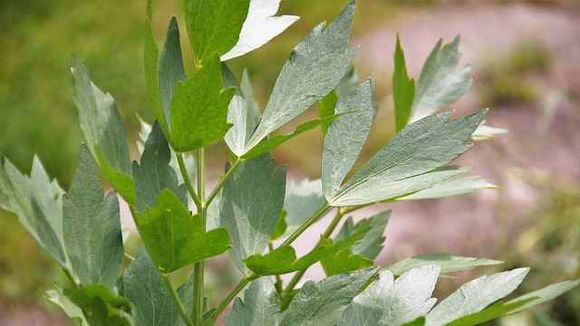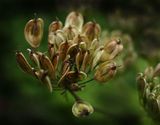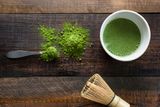A few words about Lovage
Lovage (Levisticum officinale Koch.) is a well-known aromatic plant that is often used to make dishes, flavors and medical preparations. Levisticum officinale, has a distinct earthy taste, similar to celery, but with scents of spices. This perennial herb has many uses – leaves, roots and seeds are edible – and can be used as an ingredient in soups, sauces and stews, as an accompaniment to fish dishes and to improve the taste of pickles. [ [ref. 1] ]
Above-ground parts are typically used as food, and in the past the roots were used in folk medicine because of their diuretic and antispasmodic properties. Therefore, the exploitation of this undervalued part of the plant can be a source of valuable bioactive compounds for the food and/or pharmaceutical industry, as well as for any fan of natural remedies. [ [ref. 2] ]
Health benefits provided by Lovage
In the first part of the topic we explored the beneficial effect of lovage on the digestive system, for relieving arthritic pain, calming symptoms associated with colitis and others. We continue with a review of other studied positive effects in humans and animals provided by the perennial herb Levisticum officinale.
Antibacterial effects
Research shows that lovage has a significant effect on various microbes and foreign agents that can cause disease in the body. Although research is still ongoing, studies have found positive links between taking lovage and reducing E. coli, Salmonella and other dangerous infections. [ [ref. 3] ]

Antiallergic action
Many of the health benefits of lovage are associated with its anti-inflammatory and soothing nature, and the same applies to countering the effects of allergens. In addition, there are significant amounts of quercetin in the plant, which is a natural inhibitor of histamines. It can reduce the allergic reaction of your body, which is expressed with itching in the eyes, runny nose and other symptoms. [ [ref. 4] ]
Support for healthy joints
Regular use of lovage can help maintain healthy joints. This is a great benefit for elderly people who usually have joint health problems.
Support for the pulmonary system
Levisticum officinale can help support lung function. This also means improved function of other organs and systems that directly depend on the lungs.
Reduces inflammation & relieves pain
Levisticum officinale has mild painkiller effect and can help relieve joint pain, abdominal cramps, possibly headaches and other types of pain. Research has shown that angelic acid is responsible for the mild analgesic properties of lovage, but other volatile compounds in its composition and even nutrients (such as magnesium with its antispasmodic effects) contribute to its analgesic benefits. [Ref. 5]
Helping to urinate and support the kidneys
Levisticum officinale is an aquaretic or a type of diuretic that intensifies urination without leading to the loss of electrolytes. Increased urination clears the urinary system and calcified kidney stones, which perhaps helps prevent the formation of kidney stones.
Fights harmful microorganisms
Most plants produce natural chemicals to combat harmful organisms. While some plant chemicals - such as resveratrol - work independently, researchers have found that chemical compounds in lovage work together to create a very powerful effect against harmful organisms. Scientists have found that the extract of this plant is among the most potent, acting against gram-negative bacteria such as E. coli, Salmonella, H. pylori and H. influenza. [Ref. 6]
Traditional uses of Lovage
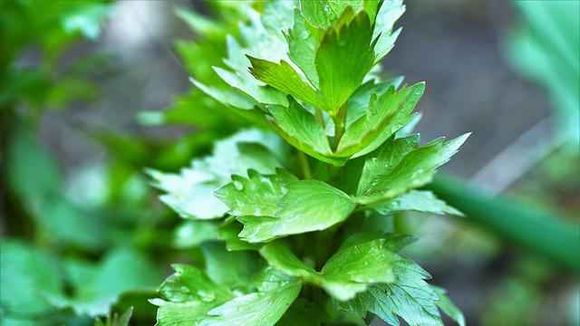
- Tea from lovage can be applied to wounds as an antiseptic or drunk to stimulate digestion.
- Lovage is a warming and restorative herb for the digestive and respiratory system.
- Roots, leaves and fruits are antispasmodic, aromatic, diuretic, slightly expectorant and stimulating urination.
- Lovage is used internally in the treatment of stomach disorders, especially in colic and flatulence in children, kidney stones, cystitis, painful menstruation.
- Essential oil from seeds is used by aromatherapists to remove freckles and spots on the face.
- Lovage is used in urinary tract infections, kidney and bladder stones.
- Traditionally used to reduce flatulence and as a natural remedy for abdominal pain caused by meteorism.
Culinary applications of Lovage
- Leaves can be used in salads, for making soup or for seasoning broths.
- Roots can be consumed as a vegetable or grated for use in salads.
- Seeds can be used as a spice, similar to fennel seeds.
- Leaves and stems can be consumed raw or boiled.
- It is used as a spicy aroma in salads, soups, stews, etc., giving a aroma close to that of celery.
- The seeds have a strong taste of yeast and are used as a flavoring in sweets, soups, salads and others.
- Lovage is used with oregano and garlic for tomato sauces in Italy, and people in the Netherlands use it as an ingredient in asparagus dishes.
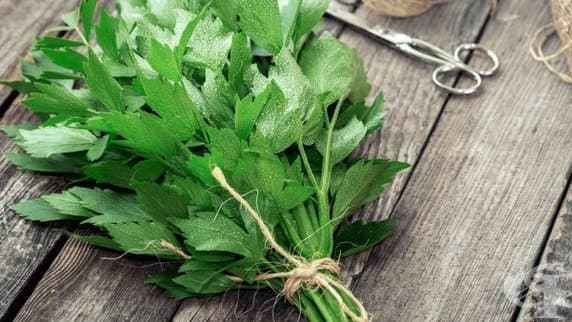
Before consuming or using Lovage
- It is claimed that the plant contains the suspected psychotropic substance myristicin.
- The volatile oil is an irritant.
- It is contraindicated in inflammation of the kidneys or urinary tract.
- Lovage can be harmful to women, and it is recommended that women who are pregnant or suffer from menstrual disorders avoid this herb.
- Lovage can also cause photodermatitis, a skin allergy that occurs after eating the herb and exposure to sunlight.
- People with kidney problems should restrain from consuming or using lovage or its derivatives.
- People with allergic conditions should avoid consuming lovage.
- Excessive consumption of the herbal plant can lead to diarrhea.
- Excessive use (repeatedly above the recommended dose) may cause kidney damage.
Recipe for soup with lovage
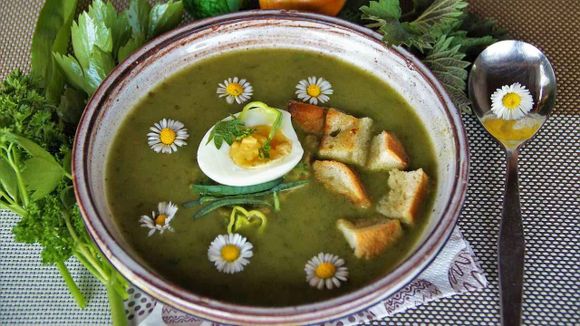
If you don't have contraindications or allergies diagnosed, then you can enjoy lovage in a delicious warm soup according to our recipe.
Necessary products:
- 20 grams cow's butter from pasture animals
- 1 onion, finely chopped
- 1 teaspoon fresh thyme leaves, chopped
- A few young stems of lovage, chopped
- 1 small handful of lovage leaves, grated
- 700 millilitres of homemade bone broth or chicken or vegetable broth
- 2 small lettuces, finely chopped
- 100 grams of peas
- Himalayan salt and freshly ground black pepper
- A few teaspoons crème fraiche or raw yogurt
Instructions for preparation:
- Heat the butter in a large saucepan over medium-low heat.
- Add the onion, thyme and a pinch of salt and stew until the onions are soft and transparent, about 10 minutes.
- Add the stalks and stew for a few minutes.
- Pour in the broth and simmer for 10 minutes.
- Add the rest of the vegetables (but set aside a few leaves of lovage for dressing) and simmer for five minutes.
- Season and serve with a little yogurt or crème fraiche and lovage leaves.
